[flv]http://www.phillipdampier.com/video/WZZM Grand Rapids Over 50 seniors displaced by fire at Battle Creek apartment complex 6-20-14.flv[/flv]
WZZM in Grand Rapids covers the fire in an independent living complex that left at least 50 seniors homeless and facing big bills from Comcast. (1:53)
 At least 50 seniors residing in an independent living complex in Battle Creek, Mich., were burned out of their apartments after a devastating fire in late June. Some of the fixed income seniors lost everything they owned.
At least 50 seniors residing in an independent living complex in Battle Creek, Mich., were burned out of their apartments after a devastating fire in late June. Some of the fixed income seniors lost everything they owned.
Despite the understanding and patience of credit card companies, banks, insurance companies, AT&T, and the local power utility — all willing to wait for payments or waive billing for those affected, one company stood out for its plan to collect damages from the fire victims: Comcast.
The Area Agency on Aging, working to help the victims, reached out to local Battle Creek media to report Comcast’s local agents were aggressively seeking compensation from the displaced seniors after learning about the fire.
“They want $120 for each cable box, despite the fact these seniors just lost their homes and many are low-income,” Carla Fales, CEO of the agency told WWMT-TV.
Comcast’s response: “Everything destroyed must be paid for.”
 As is often the case, once Comcast’s disagreeable behavior becomes a headline on the 6 o’clock local news, public relations damage control begins.
As is often the case, once Comcast’s disagreeable behavior becomes a headline on the 6 o’clock local news, public relations damage control begins.
When WWMT called Comcast’s corporate offices, the cable company assured the newsroom Comcast would probably waive the fees, but provided no guarantees.
“I can assure everyone there is a process in place; we are working individually with customers to help them in this difficult time,” offered a Comcast spokesperson.
Monday night, Battle Creek Mayor Dave Walters told WWMT that fire victims will not be held responsible for the cost of the lost equipment.
But some may be mired in paperwork to avoid the lost/damaged equipment fees.
Affected residents who were insured at the time of the fire still have to reimburse Comcast through a damage claim filed with their insurance company. Those uninsured will be asked to submit a fire report which must be requested from the local fire department. In some cases, customers may also asked to offer a notarized statement indicating they were not insured to avoid the $120 charge.
But before any of that happens, Comcast also traditionally requires customers to pay any past due balances on their account before equipment credits can be provided.
Comcast’s zeal for charging penalties for lost or damaged equipment is not limited to Michigan.
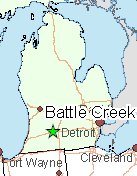 In January, a Tennessee woman’s home went up in flames and was quickly declared a total loss. The only company to give the family a hard time was Comcast, who billed them $550 for four used cable boxes and a rented cable modem melted in the fire.
In January, a Tennessee woman’s home went up in flames and was quickly declared a total loss. The only company to give the family a hard time was Comcast, who billed them $550 for four used cable boxes and a rented cable modem melted in the fire.
“I thought, ‘What are they trying to do to me?'” Emma Hilton said. “I’ve done went through a fire. I tried to salvage what I can.”
Hilton was unsure what exactly Comcast expected the fire department to do about the cable company’s equipment.
“(Firefighters) couldn’t get the TV’s. They were burning,” she told WJHL-TV.
Despite the fact her landlord leveled the rest of the uninhabitable home, Comcast still wanted to get paid if she could not recover the equipment from the ashes.
“You mean they’re actually going to charge me for those cable boxes and after I told you I had a fire?'” Hilton said of one of her phone conversations with the cable provider.
Comcast told her to read the contract, which leaves responsibility for the cable equipment entirely up to the customer. Comcast includes a strong recommendation to keep up a renter’s or homeowner’s insurance policy. Now customers know why.
In the past six years of covering these stories, Stop the Cap! has found many renters who simply don’t bother with renter’s insurance, mistakenly assuming the landlord’s own insurance policy covers their damages. But it does not. A renter’s insurance policy typically costs about $100 a year and covers the renter’s personal belongings (and cable boxes). Some policies also cover displaced living expenses — food, a hotel room, etc. They also cover liability in the event a guest is injured inside your rental property. Some cable companies demand up to $500 for each lost or damaged piece of equipment — an unnecessary point of stress and expense right after a major negative event. Get insurance. It’s a bargain.
[flv]http://www.phillipdampier.com/video/WWMT Grand Rapids Seniors Asked to Pay Comcast for Damaged Boxes 6-20-14.flv[/flv]
WWMT in Grand Rapids covers Comcast’s initial resistance to giving seniors a break on fire-damaged cable equipment after their senior living complex was heavily damaged in a fire. (1:38)


 Subscribe
Subscribe
 Most of the same telecom companies that want to create Internet paid fast lanes, drag their feet on delivering 21st century broadband speeds, refuse t0 wire rural areas for broadband without government compensation, and have cut investment in broadband expansion are warning that any attempt by the FCC to enact strong Net Neutrality policies will “threaten new investment in broadband infrastructure and jeopardize the spread of broadband technology across America, holding back Internet speeds and ultimately deepening the digital divide.”
Most of the same telecom companies that want to create Internet paid fast lanes, drag their feet on delivering 21st century broadband speeds, refuse t0 wire rural areas for broadband without government compensation, and have cut investment in broadband expansion are warning that any attempt by the FCC to enact strong Net Neutrality policies will “threaten new investment in broadband infrastructure and jeopardize the spread of broadband technology across America, holding back Internet speeds and ultimately deepening the digital divide.”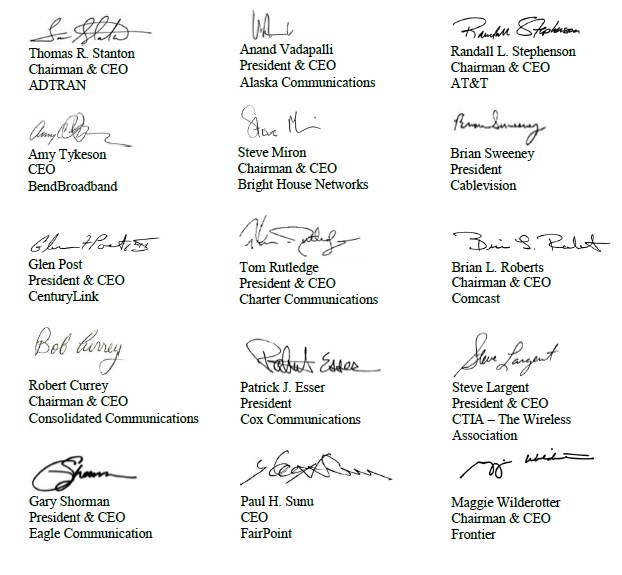
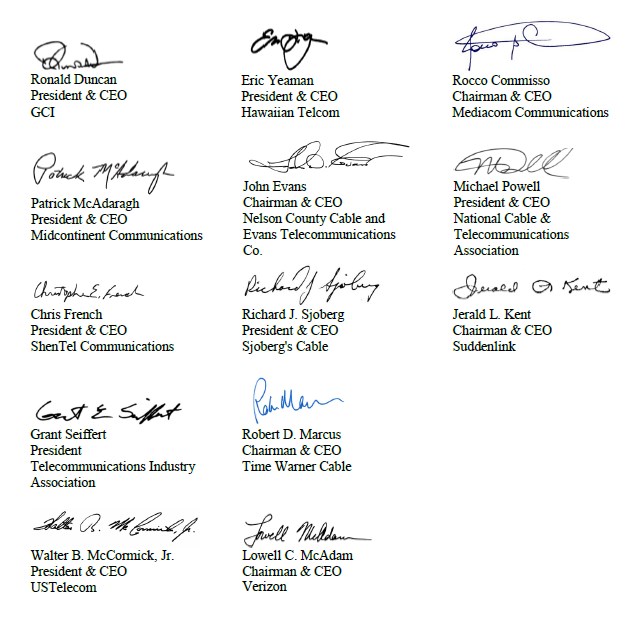
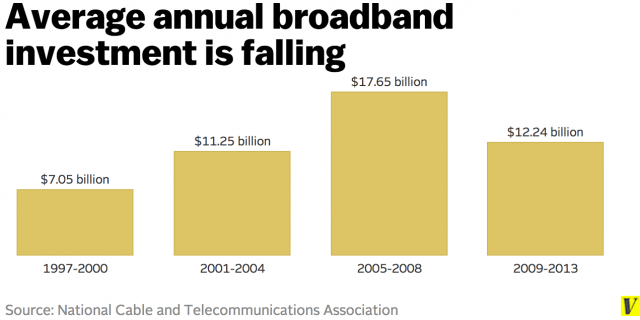
 Comcast customers in Philadelphia are organizing to stop the cable company from winning a 15-year franchise renewal to continue providing service in the city unless the cable operator changes its ways after years of rate increases and poor customer service.
Comcast customers in Philadelphia are organizing to stop the cable company from winning a 15-year franchise renewal to continue providing service in the city unless the cable operator changes its ways after years of rate increases and poor customer service.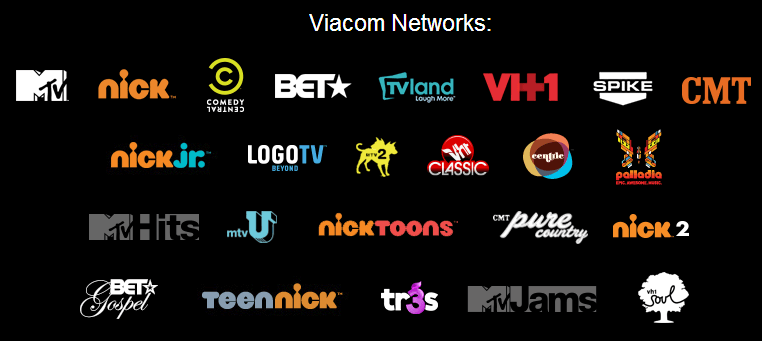 Small cable systems across the country and on overseas military bases are being granted hourly reprieves that are keeping up to 24 Viacom-owned cable channels on the air after negotiations to extend an agreement with their program buyer stalled.
Small cable systems across the country and on overseas military bases are being granted hourly reprieves that are keeping up to 24 Viacom-owned cable channels on the air after negotiations to extend an agreement with their program buyer stalled. NCTC members complain Viacom requires cable systems to carry nearly all of its lineup, including lesser-known channels few customers have even heard of, much less want. Even if a cable system chooses not to air a Viacom channel, Viacom’s contracts require cable providers to pay for them if they want to carry Viacom’s most popular networks.
NCTC members complain Viacom requires cable systems to carry nearly all of its lineup, including lesser-known channels few customers have even heard of, much less want. Even if a cable system chooses not to air a Viacom channel, Viacom’s contracts require cable providers to pay for them if they want to carry Viacom’s most popular networks. For most affected cable operators, there is a ‘wait and see what happens’ approach. Others, including Cable ONE, have already moved to replace the Viacom networks with other channels.
For most affected cable operators, there is a ‘wait and see what happens’ approach. Others, including Cable ONE, have already moved to replace the Viacom networks with other channels. Earlier today, Cable ONE didn’t wait for Viacom to pull the plug. They pulled it themselves.
Earlier today, Cable ONE didn’t wait for Viacom to pull the plug. They pulled it themselves. We are offering Service Electric a double-digit discount off of our standard rate card. It is a better deal than HUNDREDS of other TV providers in the country have agreed to. We have been actively trying to get a deal done with Service Electric for months and they have refused to negotiate in any meaningful way. And now, on top of this, Service Electric is throwing out numbers which simply aren’t true. Our expiring deal with Service Electric is nearly five years old. In that time, we have been great partners and given Service Electric more channels, more on demand content and access to our content beyond the TV – at no additional cost. We don’t understand why Service Electric has chosen to negotiate in this manner. And now, as a result of their lack of interest in coming to a mutually beneficial agreement, you are at risk of losing 19 Viacom networks. We are serious about getting a deal done.
We are offering Service Electric a double-digit discount off of our standard rate card. It is a better deal than HUNDREDS of other TV providers in the country have agreed to. We have been actively trying to get a deal done with Service Electric for months and they have refused to negotiate in any meaningful way. And now, on top of this, Service Electric is throwing out numbers which simply aren’t true. Our expiring deal with Service Electric is nearly five years old. In that time, we have been great partners and given Service Electric more channels, more on demand content and access to our content beyond the TV – at no additional cost. We don’t understand why Service Electric has chosen to negotiate in this manner. And now, as a result of their lack of interest in coming to a mutually beneficial agreement, you are at risk of losing 19 Viacom networks. We are serious about getting a deal done.